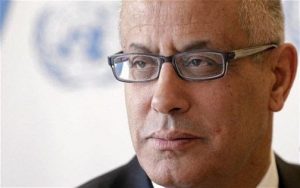The Platform [i] strongly condemns the disappearance of the former Prime Minister of Libya, Mr. Ali Zeidan, for the seventh consecutive day amidst the shameful silence of the authorities in the capital Tripoli. The Platform demands the immediate disclosure of Mr. Zeidan’s condition and the location of his detention, as well as the assurance that he is provided with the necessary medical care. The Platform further demands strict adherence to legal procedures in accordance with Libyan law and international agreements, the provisions of which oblige Libya to combat enforced disappearances.
According to Mr. Zeidan’s family, he arrived to Tripoli on Friday (August 11th). He first stayed at Al-Mahari Hotel and then moved to Victoria Hotel, which is secured by the guard of the Presidential Council. After 7:30 pm on Sunday (August 13th), he disappeared. He was accompanied by a battalion of the Tripoli Brigade to an undisclosed location. Thus far, neither his family and the relatives of his companion Mr. Mahmoud al-Sharif al-Kabir, nor Mr. Zeidan and Mr. al-Kabir’s lawyers, have been able to contact either of them. According to the Attorney-General of Tripoli, no warrant has been issued for the arrest of Mr. Ali Zeidan. The Attorney-General did issue a travel ban for Mr. Zeidan in March of 2014; however, it was lifted on the 19th of June, 2014.
The Platform denounces the silence of the Presidential Council on the enforced disappearance of Mr. Ali Zeidan and his companion Mr. Mahmoud al-Sharif, as well as the widespread impunity in Libya. Furthermore, the Platform organizations affirm our condemnation of the Presidential Council’s disregard of the political agreement’s terms- particularly the temporary security arrangements – since its ratification and the founding of a unified brigade called the Presidential Guard. The organizations also deplore the failure of the Presidential Council to implement the political agreement concerning the release of the forcibly disappeared and the extrajudicially detained, as set out in the Confidence Measures section.
Mr. Zeidan’s disappearance comes at a time when armed groups continue to kidnap and hide civilians, including politicians and journalists, with apparent immunity from prosecution. Abdel Moez Banoun – a prominent activist and a critic of militia and government violations both on social media and in the public sphere – has been missing since his abduction on July 25th, 2014 in Tripoli by an unknown armed group. Jabir Zein, a human rights activist, remains forcibly disappeared since being escorted on September 26th, 2016 by members of the Second Special Support Division based in the Fernaj district in Tripoli. The group, also known as Martyr Adnan Al-Shibani Brigade, an armed group that is part of the forces tasked with the Presidential Council’s security arrangements. Many others have also been forcibly disappeared and extrajudicially detained in Libya.
In this regard, the Platform welcomes the decision of the International Criminal Court to arrest the Special Forces (Sa’qa) Commander Mahmoud Mustafa Busayf Warfali, in connection with accusations of committing and ordering the commission of war crimes; the commander murdered 33 people in Benghazi and the surrounding areas sometime between June 3rd, 2016 and July 17th, 2017. We await further international action that ends the impunity of perpetrators of grave human rights violations in Libya.
[i] The Platform was founded in 2016. The vision of the Platform is to create a space for exchange, dialogue and coordination in order to develop and enhance the capacity of the Libyan civil society and enable it to play an effective role in promoting public freedoms and human rights. Furthermore, the Platform envisions the development of a joint strategy for change and impact on the different levels.
The members of the Platform agreed on the following objectives that define the joint approach of the Platform:
- Breaking the barrier between civil society organizations working in the field of human rights and defenders inside and outside Libya, working towards a better distribution of roles between the two.
- Creating a safe space for civil society members to engage in dialogue and critical thinking, with the purpose of developing a comprehensive vision for the implementation of a strategy of change and influence on all levels.
- Enhancing the efficiency of Libyan civil society organizations in documenting violations and monitoring the human rights situation in the country.
- Bridging the gap represented in the absence of an international mechanism to document grave violations of human rights in Libya by granting a greater mandate to local professional documentation groups working in safe circles.
- Strengthening and improving the capacity of civil society organizations to play an active role in local, regional and international advocacy.
- Supporting the active and genuine participation of civil society organizations in adopting peaceful solutions, monitoring the implementation of agreements, ensuring their participation in the transitional period, and promoting a culture of peaceful coexistence and acceptance of the other.
- Combating impunity, hate speech and violence; ensuring freedom of expression, association and peaceful assembly; protecting activists and media from attacks; ensuring their safety; and guaranteeing a secure environment for them.
Share this Post


